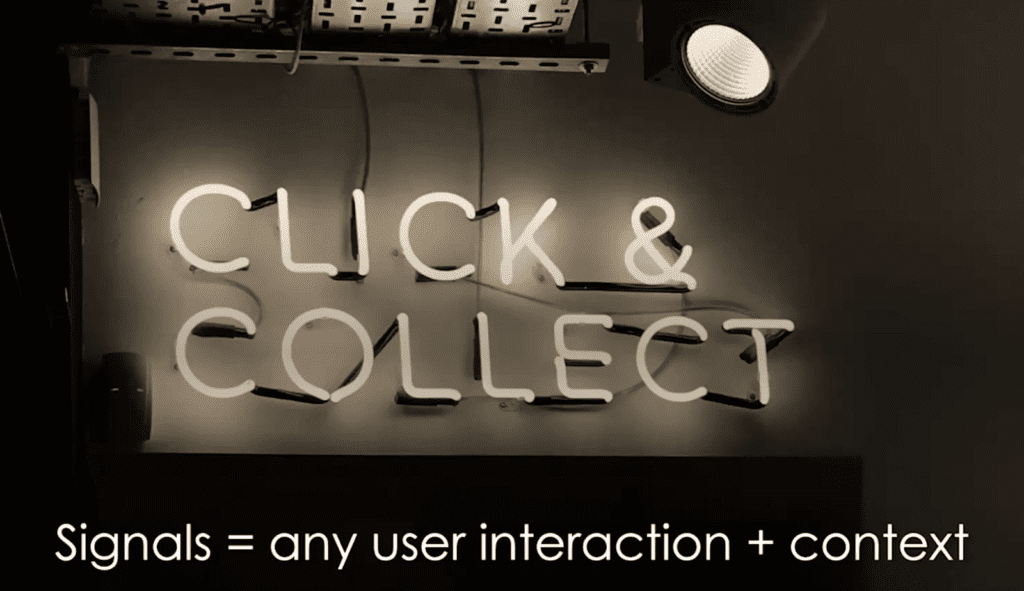Maximize Your Return on Machine Learning Investments
Get the highest business impact from your signals architecture and personalize user experiences in real-time.

Lucidworks’ first virtual Activate brought together a range of experts in the field of machine learning and AI. This year included talks from our own internal experts, including Lucidworks’ Data Science Manager Mark Moyou who shared how enterprises can maximize their machine learning capabilities using signals in Fusion to deliver personalized search experiences.
Watch Mark Moyou’s talk today.
Today, customers expect a great search experience that delivers meaningful results with suggestions of new items, products, and articles to explore based on their preferences. Delivering this experience requires leveraging signals (user-feedback on search application) within your search framework. Read on to learn how you can empower merchandisers, search architects and data scientists to make their own data-driven decisions, backed by ML running at scale in the background.
What Are Signals?

Moyou defines signals as any user interaction on a platform or site in addition to the context around it (user IDs, filters, IP address/login region, timestamp, etc.). Signals capture the voice of a user through their interactions and behavior on a company’s website or internal platform. Interactions include actions such as add-to-cart, clicks, and page dwell time.
Signals can vary for different use cases. For example, signals on ecommerce sites focus around shoppers interacting with a product catalog through add-to-cart, cart view, and checkout initiation. Whereas signals in a private intranet focus around knowledge workers and support agents interacting with documents through clicks, bookmarks, and downloads.
“Without signals, companies are not able to provide a personalized user search experience.” – Mark Moyou
Delivering a personalized search experience requires companies to listen to their users and understand their behavior without being too invasive. Using signal data, companies can enhance their machine learning capabilities to deliver personalized content in the form of more relevant search results and recommendations to end users. Signals supply machine learning algorithms with user behavior to rank results and uncover user insights in real-time.
Signals and Fusion 5
In order to understand a user’s intent and the context of their query, companies must have a scalable infrastructure that’s capable of effortlessly storing and searching across a growing database to fully leverage signal data. With Lucidworks Fusion, search teams can hit the ground running by leveraging out-of-the-box machine learning models. With Fusion’s signal collection capabilities, organizations are able to:
- process queries natively
- perform large scale aggregations at query-time
- surface new organizational wisdom or insights
- train question answer-pairs with deep learning
Some of the world’s largest brands have experienced a noticeable uptick in user satisfaction and search performance after deploying signals. Here are a couple examples:
- The top hardware store in the US said that Fusion’s ability to collect signals anywhere and apply those insights (in real-time) on every channel made their omnichannel strategy finally come to life.
- Another top retailer relies on signals to provide a consistently personalized experience on their website and were able to increase conversions from 4.6% to 7%.
- For Lenovo, implementing signals led to a 73% increase in search engagement, 93% increase in clickthrough rate, and a 35% conversion rate that led to a 34% increase in customer satisfaction.
- Red Hat benefited from Fusion’s signal capabilities in effortlessly delivering the right content to users to achieve a 11.6% decrease in case creation, as well as a 7.39% increase in support case deflection rate within two months.
Fusion Puts Machine Learning at Your Fingertips
Fusion 5.0 and beyond includes a Data Science Toolkit that allows data scientists to extend their platforms by combining their ML algorithms with Fusion’s. Lucidworks’ Data Science Toolkit Integration offers a model service that adds intelligence for processing incoming queries and documents, making it simple for companies to augment their current machine learning capabilities and extract data entities from a diverse set of language models.
Interested in learning more about Fusion and its machine learning capabilities? Contact us today and be sure to register for next year’s Activate.
LEARN MORE
Contact us today to learn how Lucidworks can help your team create powerful search and discovery applications for your customers and employees.